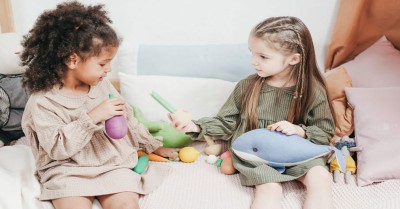Sharing is challenging for children, especially toddlers. This happens frequently during the development process. The first step in teaching children to share is realising and accepting this. The following article provides information on the Benefits Of Learning To Share, Social Development In Babies and Toddlers, How To Encourage Sharing and more.
Benefits Of Learning To Share
Caregivers ensure that from the moment a child is born, all their needs are fulfilled. Even when babies begin to realise that they are distinct entities and not part of their primary caregiver’s self, their worldview still does not consist of other beings and perspectives. However, as children grow older their interactions increase with the outside world – they go to school, play in the neighbourhood and accompany their family to the grocery store. Such interactions necessitate getting along with others, especially with peers who are also just exploring a world outside themselves. Children learn that if we give a little to others, we can get some of what we want too. This helps children to play and work together, make friends and keep them to play another day.
Sharing also prepares the ground for more complex social skills like turn-taking and negotiation. When children learn to step outside their own ego, in a psychological sense, and understand another’s needs and likes, they learn to follow through the more complicated understandings required in giving and taking turns as well as allowing others to adopt roles and gain privileges so that they can do the same for themselves.
Sharing teaches children about fairness. Even when it doesn’t suit us to share toys and resources, the notion that everyone deserves to feel happy is a great step in social learning since it forms the basis of equity and justice.
Social Development In Babies and Toddlers
Socially by eight months babies can react with arousal, attention or approach to the presence of another baby or young child but are still not ready to share toys and resources. Between one and two years, children are getting more assured in expressing needs and desires even as they are seeking out the company of peers. Earlier in this stage, they engage in parallel play in which they play alongside other toddlers, doing what they do but without seeming to interact. Eventually, though they start joining peers in play and show a readiness for cooperative play. From two years onwards, toddlers become very interested in their peers – they are keen to make connections and explore ways of reaching out to others.
As children enjoy playing and responding positively to others, including peers, their actions reveal links with EYLF Outcome 2 - Children are connected with and contribute to their world – and particularly with Element 2. 1 ‘Children develop a sense of belonging to groups and communities and an understanding of the reciprocal rights and responsibilities necessary for active community participation. Also as they discover and explore some connections among people, their growing social/emotional understanding can be linked to Element, 2.3. ‘Children become aware of fairness.
How To Encourage Sharing
Know The Basics
Understanding the stages of social development in children will help educators know when and how to support toddlers in the act of sharing. For example, though at twelve months, a baby might offer a toy to an adult or a playmate, they may show a disinclination to release it. On the other hand, around two years, toddlers appear to assist another in distress by patting, making sympathetic noises or offering material objects. This shows a readiness to share, even if briefly, which the educator can use as a learning moment and build social skills.
Role Play Sharing
Children learn by observing their caregivers which means that educators can play a huge role in teaching children to share. For example, you can use block play to demonstrate turn-taking to children and as you do, call attention to the steps, ‘Now it’s my turn to build the tower, then it’s your turn. You share the red blocks with me, and I’ll share the green blocks with you. Similarly, you can use pretend play to model basic negotiation skills like who gets to be the doctor, the baby and the mommy at the doctor’s chamber.
Plan Activities
Introduce opportunities where children can practice sharing and other cooperative skills. Circle time is a great example, which allows children lots of opportunities to follow your lead and practice taking turns, for instance, to greet each other or share something interesting that happened on way to the centre. Let children choose dress-ups together or draw a big picture together using the same packet of crayons. Try and stick to cooperative games that don’t involve a single winner when practising sharing with toddlers. Also look for routines and day-to-day moments when children can practice sharing, like waiting to eat at the table till everyone has been served.
Give Structure
Using a pocket timer is a great way to make turn-taking a little easier for toddlers. When it rings, it is one child’s turn to give a toy to a friend, then they get it back once the timer rings again, and so on. This way children start learning that giving something away isn’t for always which makes sharing that much easier for toddlers who still haven’t gotten used to the concept of time.
Also when young children feel threatened, for example when a friend tries to snatch their toy, they often respond in an aggressive way. This could result in grabbing, hitting, and throwing things. When you see something like this unfolding, move in close and stop the aggression. A simple statement in a low voice such as, “I can’t let you hit,” or “No grabbing,” can be enough to handle the situation in a calm but authoritative way.
Make It Real
Fairness and sharing are abstract concepts to young children so just telling them, “Be fair” or “Share with your friend” is unlikely to get a child to offer a toy or crayons to peers. Instead, give them the words and phrases to demonstrate sharing in actions. For example, ‘Your friend was sharing her toys really well. That was very kind of her’. Talk about why sharing is good for the child and others. You can say something like, ‘When you share your toys with your friend, everyone gets to have fun’.
Reinforce Sharing
People working with children know that one of the most effective ways of encouraging desirable behaviour in children is to point out and praise such behaviour in action – in other, positive reinforcement. So the next time you see your child trying to share or take turns, especially on their own, quickly offer positive reinforcement with a broad smile or loud praise. For example, ‘I liked the way you let Aziz play with your train. Great sharing!’. It need not be lavishly done but just enthusiastic enough to imply that their efforts to share have been noticed and are appreciated.
Offer Support
If you find a particular child or two having difficulty in sharing, it may be a good idea to stay nearby when they play with other children and encourage them so they don’t forget to share. When the same children do try to share, you can say exactly what they did well and how proud you are of their efforts.
Consequences For Not Sharing
For children above three, you can introduce consequences for not sharing. So for instance, if children are not sharing a toy train, you might take the train away from both of them for a short period of time. Neither child can play with the train, so the consequence feels the same for both of them. However, when using consequence, see that children are at a development stage to understand it. Also, it is important to relate the consequences relate to the thing that’s being shared – or not shared, like the toy train – rather than making it about how the same two children had fought over the playground swing the previous week.
Be Patient
Teach social skills that are age appropriate. While toddlers can be taught to practice simple turn-taking or basic sharing like toys, wait till kids are a little older to practice complex negotiation and problem-solving skills. Also if you are a toddler, it takes time to understand why you need to say certain words and behave in specific ways when till now you have been getting what you wanted, without all this extra effort. So allow children some time to put what they have been taught into practice. The more they see their adult caregivers share and take turns around, the easier it will be for children to use the same social skills.
Further Reading
- Social and Emotional Development for Infants 0-12 months - The following lists the social and emotional development of infants 0 - 12 months.
- Social and Emotional Development for Babies 12-24 months - The following lists the social and emotional development of babies 12 - 24 months.
- Supporting Children Developing Friendships - The following article provides information on the benefits of childhood friendships, supporting children developing friendships, friendship problems and more.
- EYLF Learning Outcome 2: Children Are Connected With And Contribute To Their World - The following lists the sub outcomes, examples of evidence when children can achieve each sub outcome and how educators can promote and help children to achieve EYLF Learning Outcome 2: Children Are Connected With And Contribute To Their World.
References:
Sharing In Toddlers, Raising Children
Belonging, Being and Becoming, ACECQA
Helping Young Children With Sharing, Zero To Three
Developmental Milestones, EYLF







 Open ended questions cannot be responded to with one word answers such as yes or no. These types of questions enables a child to provide
Open ended questions cannot be responded to with one word answers such as yes or no. These types of questions enables a child to provide During your child’s preschool years, an important milestone begins to emerge. This is the development of pre-writing skills. Pre-writing skills are used to encourage, develop
During your child’s preschool years, an important milestone begins to emerge. This is the development of pre-writing skills. Pre-writing skills are used to encourage, develop Open ended materials enables children to play freely. They are objects that have no rules to follow, use or function. Raw materials that can be
Open ended materials enables children to play freely. They are objects that have no rules to follow, use or function. Raw materials that can be An Acknowledgment of the Country is a way of showing respect for the Traditional Owners and can be given by both non-Indigenous people and Aboriginal
An Acknowledgment of the Country is a way of showing respect for the Traditional Owners and can be given by both non-Indigenous people and Aboriginal Language plays an important role in a child’s development. It enables a child to communicate effectively with their family, learn at school, socialize with friends,
Language plays an important role in a child’s development. It enables a child to communicate effectively with their family, learn at school, socialize with friends, Like adults, children have to deal with their own stress in life. Moving house, starting a new school, preparing for a new sibling - these are
Like adults, children have to deal with their own stress in life. Moving house, starting a new school, preparing for a new sibling - these are Playdough is such a versatile material. It provides numerous benefits to children as they manipulate it, it is safe and soothing and provides children with
Playdough is such a versatile material. It provides numerous benefits to children as they manipulate it, it is safe and soothing and provides children with Teaching children about sustainability enables them to appreciate and respect the natural environment. Early childhood services can provide meaningful hand on learning experiences in order
Teaching children about sustainability enables them to appreciate and respect the natural environment. Early childhood services can provide meaningful hand on learning experiences in order Recycling is an important concept that teaches children to care for the environment. It encourages children to be responsible and show a growing appreciating for
Recycling is an important concept that teaches children to care for the environment. It encourages children to be responsible and show a growing appreciating for When children apply paint to paper, glue things together, or pound a lump of clay, they experiment with colour, shape design and texture.
When children apply paint to paper, glue things together, or pound a lump of clay, they experiment with colour, shape design and texture.



